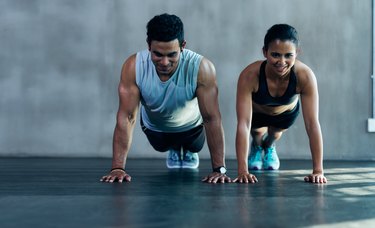
"Buff" can mean different things to different people, but usually it connotes a taut, chiseled look that's muscular without necessarily being bulky. Push-ups and pull-ups together cover quite a bit of core and upper-body real estate and will take you far toward that Greek god look. Each activates muscle groups in the neck, chest, shoulders, arms, back and to some extent, the abdominal muscles.
However, limiting yourself to push-ups and pull-ups does neglect the legs and glutes, and probably isn't giving the abs their due. Also, while these two exercises do cover two of the three planes of motion — front to back and side to side — you should pay some attention to the transverse plane, which means rotational exercises such as the rotational lunge or the horizontal wood chop, according to ACE Fitness.
Video of the Day
Video of the Day
Bottom line: Do push-ups and pull-ups to your heart's content, but save a little space in your workout for the rest of your body.
Tip
Push-ups and pull-ups will help you get more buff — from the waist up. For overall "buffness," work on your core and legs too.
A Weighty Matter
If your goal is to build muscle, push-ups and pull-ups will definitely add to your muscle mass if you do enough of them. But it's worth keeping in mind that resistance training with heavier weights that bring you to temporary muscle failure after six to eight reps are likely to build muscle faster.
At a certain point, though, you plateau unless you add weight. With body weight exercises like push-ups and pull-ups, you might add weight by wearing a weight vest or ankle weights, but you're still more or less tethered to whatever you weigh. That means to build muscle you'll need to pile on the reps.
Failure Is Success
To get the most out of any resistance exercise, you need to do as many reps as it takes to reach temporary muscle fatigue. That's the signal that you've inflicted some of that hurts-so-good kind of damage, the kind that your body responds to by growing muscle fibers to repair the tiny tears and lesions that exercise has caused. For body weight exercises, the American Council on Exercise suggests a range of 10 to 15 reps, but if you're looking to get seriously buff that's just for starters.
You might try working up to two to four sets of 20 or more reps each of push-ups and pull-ups. With body weight exercises, you can also think outside of the traditional rep/set box. For example, try exercising for time instead of counting reps. Or, try the "ladder" approach: start with a set of two reps, rest briefly, then do four. Proceed by doubling the number of reps until you reach your maximum.
Rounding It Out
At the end of the day, nobody really wants to be just partially buff. For that matter, it's quite possible to look incredibly fit and still be so weak in the core muscles that you're a pushover for injury. In order to bring about a fair distribution, round out your regimen with other muscle-strengthening and stretching activities such as yoga and light weights.
For major health benefits, the National Institutes of Health recommends doing at least 150 minutes of moderate-intensity cardiovascular activity, or 75 minutes of high-intensity activity, each week. So hit the treadmill, take those stairs or start jogging.
"Buff" and Body Fat
Whatever is going on with your muscles, if you've got a lot of excess weight, trying to deal with it by exercise alone is taking the long way around. You can have an amazingly sculpted torso, but if it's wearing a fat suit, nobody will know.
So it may be appropriate to give due diligence to diet. To lose a pound of fat you have to burn 3500 calories. Cutting your food intake by 500 to 1,000 calories a day sets you up nicely to lose the one to two pounds a week, a rate that the National Institutes of Health recommends as healthy.